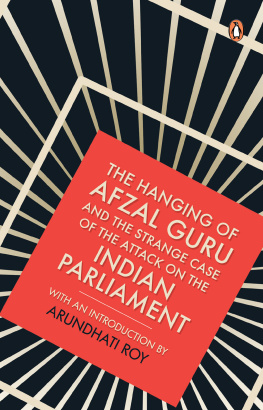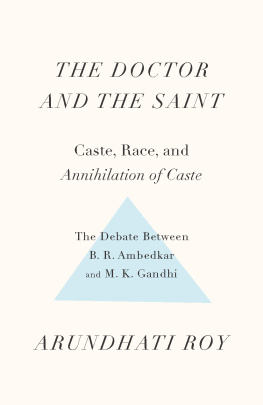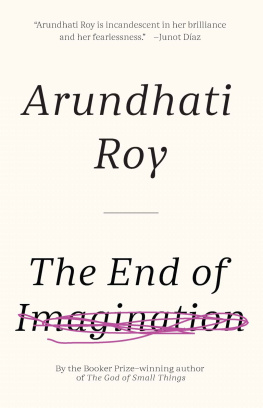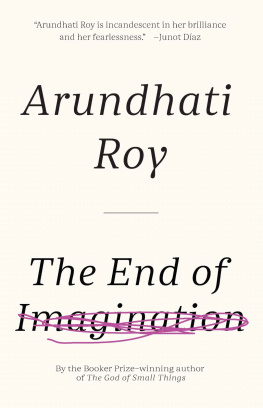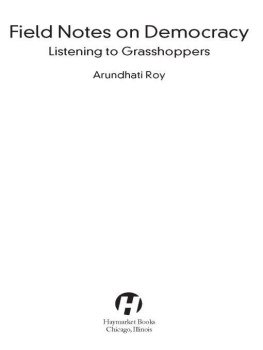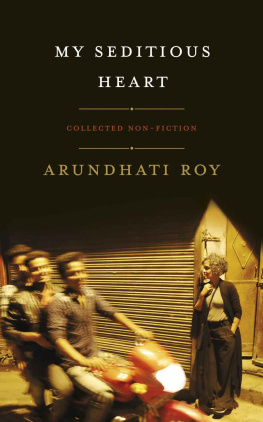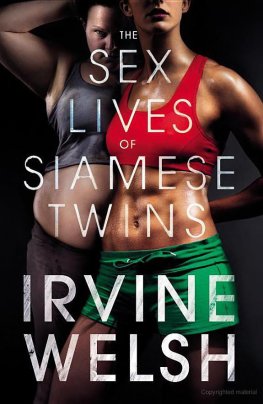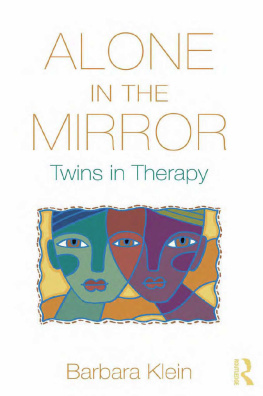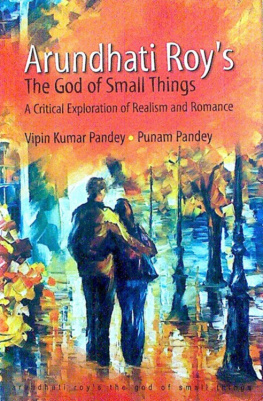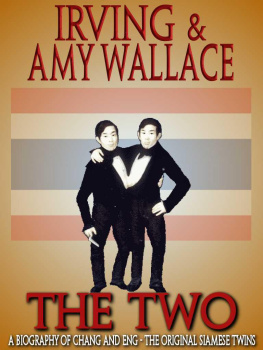
Arundhati Roy
The God of Small Things
Paradise Pickles & Preserves
May in Ayemenem is a hot, brooding month. The days are long and humid. The river shrinks and black crows gorge on bright mangoes in still, dustgreen trees. Red bananas ripen. Jackfruits burst. Dissolute bluebottles hum vacuously in the fruity air. Then they stun themselves against clear windowpanes and die, fatly baffled in the sun.
The nights are clear, but suffused with sloth and sullen expectation.
But by early June the southwest monsoon breaks and there are three months of wind and water with short spells of sharp, glittering sunshine that thrilled children snatch to play with. The countryside turns an immodest green. Boundaries blur as tapioca fences take root and bloom. Brick walls turn moss green. Pepper vines snake up electric poles. Wild creepers burst through laterite banks and spill across flooded roads. Boats ply in the bazaars. And small fish appear in the puddles that fill the PWD potholes on the highways.
It was raining when Rahel came back to Ayemenem. Slanting silver ropes slammed into loose earth, plowing it up like gunfire. The old house on the hill wore its steep, gabled roof pulled over its ears like a low hat. The walls, streaked with moss, had grown soft, and bulged a little with dampness that seeped up from the ground. The wild, overgrown garden was full of the whisper and scurry of small lives. In the undergrowth a rat snake rubbed itself against a glistening stone. Hopeful yellow bullfrogs cruised the scummy pond for mates. A drenched mongoose flashed across the leaf-strewn driveway.
The house itself looked empty. The doors and windows were locked. The front verandah bare. Unfurnished. But the skyblue Plymouth with chrome tailfins was still parked outside, and inside, Baby Kochamma was still alive.
She was Rahels baby grandaunt, her grandfathers younger sister. Her name was really Navomi, Navomi Ipe, but everybody called her Baby. She became Baby Kochamma when she was old enough to be an aunt. Rahel hadnt come to see her, though. Neither niece nor baby grandaunt labored under any illusions on that account. Rahel had come to see her brother, Estha. They were two-egg twins. Dizygotic doctors called them. Born from separate but simultaneously fertilized eggs. Estha-Esthappen was the older by eighteen minutes.
They never did look much like each other, Estha and Rahel, and even when they were thin-armed children, flat-chested, wormridden and Elvis Presley-puffed, there was none of the usual Who is who? and Which is which? from oversmiling relatives or the Syrian Orthodox bishops who frequently visited the Ayemenem House for donations.
The confusion lay in a deeper, more secret place.
In those early amorphous years when memory had only just begun, when life was full of Beginnings and no Ends, and Everything was Forever, Esthappen and Rahel thought of themselves together as Me, and separately, individually, as We or Us. As though they were a rare breed of Siamese twins, physically separate, but with joint identities.
Now, these years later, Rahel has a memory of waking up one night giggling at Esthas funny dream.
She has other memories too that she has no right to have.
She remembers, for instance (though she hadnt been there), what the Orangedrink Lemondrink Man did to Estha in Abhilash Talkies. She remembers the taste of the tomato sandwiches-Esthas sandwiches, that Estha ate-on the Madras Mail to Madras.
And these are only the small things.
Anyway, now she thinks of Estha and Rahel as Them, because, separately, the two of them are no longer what They were or ever thought They would be.
Ever.
Their lives have a size and a shape now. Estha has his and Rahel hers.
Edges, Borders, Boundaries, Brinks and Limits have appeared like a team of trolls on their separate horizons. Short creatures with long shadows, patrolling the Blurry End. Gentle half-moons have gathered under their eyes and they are as old as Ammu was when she died. Thirty-one.
Not old.
Not young.
But a viable die-able age.
They were nearly born on a bus, Estha and Rahel. The car in which Baba, their father, was taking Ammu, their mother, to hospital in Shillong to have them, broke down on the winding tea-estate road in Assam. They abandoned the car and flagged down a crowded State Transport bus. With the queer compassion of the very poor for the comparatively well off, or perhaps only because they saw how hugely pregnant Ammu was, seated passengers made room for the couple, and for the rest of the journey Estha and Rahels father had to hold their mothers stomach (with them in it) to prevent it from wobbling. That was before they were divorced and Ammu came back to live in Kerala.
According to Estha, if theyd been born on the bus, theyd have got free bus rides for the rest of their lives. It wasnt clear where hed got this information from, or how he knew these things, but for years the twins harbored a faint resentment against their parents for having diddled them out of a lifetime of free bus rides.
They also believed that if they were killed on a zebra crossing, the Government would pay for their funerals. They had the definite impression that that was what zebra crossings were meant for. Free funerals. Of course, there were no zebra crossings to get killed on in Ayemenem, or, for that matter, even in Kottayam, which was the nearest town, but theyd seen some from the car window when they went to Cochin, which was a two-hour drive away.
The Government never paid for Sophie Mols funeral because she wasnt killed on a zebra crossing. She had hers in Ayemenem in the old church with the new paint. She was Estha and Rahels cousin, their uncle Chackos daughter. She was visiting from England. Estha and Rahel were seven years old when she died. Sophie Mol was almost nine. She had a special child-sized coffin.
Satin lined.
Brass handle shined.
She lay in it in her yellow Crimplene bell-bottoms with her hair in a ribbon and her Made-in-England go-go bag that she loved. Her face was pale and as wrinkled as a dhobis thumb from being in water for too long. The congregation gathered around the coffin, and the yellow church swelled like a throat with the sound of sad singing. The priests with curly beards swung pots of frankincense on chains and never smiled at babies the way they did on usual Sundays.
The long candles on the altar were bent. The short ones werent. An old lady masquerading as a distant relative (whom nobody recognized, but who often surfaced next to bodies at funerals-a funeral junkie? A latent necrophiliac?) put cologne on a wad of cotton wool and with a devout and gently challenging air, dabbed it on Sophie Mols forehead. Sophie Mol smelled of cologne and coffinwood.
Margaret Kochamma, Sophie Mols English mother, wouldnt let Chacko, Sophie Mols biological father, put his arm around her to comfort her.
The family stood huddled together. Margaret Kochamma, Chacko, Baby Kochamma, and next to her, her sister-in-law, Mammachi-Estha and Rahels (and Sophie Mols) grandmother. Mammachi was almost blind and always wore dark glasses when she went out of the house. Her tears trickled down from behind them and trembled along her jaw like raindrops on the edge of a roof. She looked small and ill in her crisp off-white sari. Chacko was Mammachis only son. Her own grief grieved her. His devastated her.
Though Ammu, Estha and Rahel were allowed to attend the funeral, they were made to stand separately, not with the rest of the family. Nobody would look at them.
It was hot in the church, and the white edges of the arum lilies crisped and curled. A bee died in a coffin flower. Ammus hands shook and her hymnbook with it Her skin was cold. Estha stood close to her, barely awake, his aching eyes glittering like glass, his burning cheek against the bare skin of Ammus trembling, hymnbook-holding arm.
Next page

